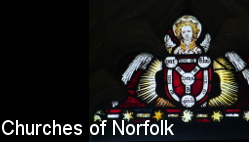
home I index I introductions I e-mail I about this site
St Peter, Repps
Follow these journeys as they happen at Last Of England Twitter.
| St Peter,
Repps The loneliest part of the Broads is the area beween the Thurne and the Bure, and Repps is a tiny village at the end of a long narrow lane down to the river, something of a relief after the tourist clamour of Wroxham and Hoveton. It's part of the joint parish of Repps-with-Bastwick, and Bastwick is the larger of the two villages. Repps church sits all on its own about halfway between the two. The former Bastwick church tower still stands beyond the road to Potter Heigham, the church beside it long since gone, and so Repps church serves both villages. The origin of the name Repps is uncertain. It may be from the relatively obscure Old English word 'ripel' meaning a strip of land. Perhaps more likely, given how close we are to the Fleggs, that Norfolk hotspot of Old Norse names, it might be the Scandinavian 'hreppr', meaning a district or community. It isn't unique in Norfolk, for some twenty miles to the north of here are the twin parishes of Northrepps and Southrepps, which would also seem to suggest an Old Norse derivation. The church is fairly typical for this part of Norfolk, a small structure of the late 13th and early 14th Centuries against a round tower which is 12th Century in its lower stage. When the church was rebuilt they added an octagonal bell stage, and then in the 15th Century a red brick crown of battlements. This also seems to have been the time that the chancel was rebuilt, but it was clearly ruinous by the 18th Century because it was then rebuilt in brick, as at Surlingham and Chedgrave. A pleasing combination, and pleasing inside too, pretty much entirely the flavour of its 1890s restoration. This was not a bad decade for church restorations. The heavy-handed enthusiasms of the previous few decades were now frowned upon, and the Church of England had not yet reached that mawkish apotheosis which the years immediately before the First World War would bring. You step into a simple, lightly furnished space. When I was here in September 2022 it was shortly after the death of the Queen, and at the back of the church there was her portrait, a condolences book and a single lily in a vase. It was well done. The font is an elegant 15th Century example, scaled down to suit the church, and matching the screen which is similarly small and simple. Pevsner detected 16th Century work in it, though it is hard to see anything old. Steps mount to the sanctuary beyond, presumably the work of the 1890s restoration. At the time of the 1851 census there were 330 people living in Repps-with-Bastwick, and the church was under the care of a perpetual curate, the Reverend Frederick Hill. The tithe income of £400 a year, about £80,000 in today's money, went to the Great Hospital of St Helen in Norwich, and they paid Hill £150 a year for his work, equivalent to about £30,000. In his return for the Census of Religious Worship held the same day, Hill made the point that it is respectfully suggested that the salary to the clergyman is not sufficient. There is no house of residence. Unlike many perpetual curates, Hill appears to have had no other form of income, but what a luxury it would be now for a church like this to have its own minister and to be able to pay them that much! Simon Knott, October 2022 Follow these journeys as they happen at Last Of England Twitter. |
|
|||||||||||||||||||||||||||||||||||||||||||||||||||||||
home I index I latest I introductions I e-mail I about
this site I glossary
Norwich I ruined churches I desktop backgrounds I round tower churches
links I small
print I www.simonknott.co.uk I www.suffolkchurches.co.uk